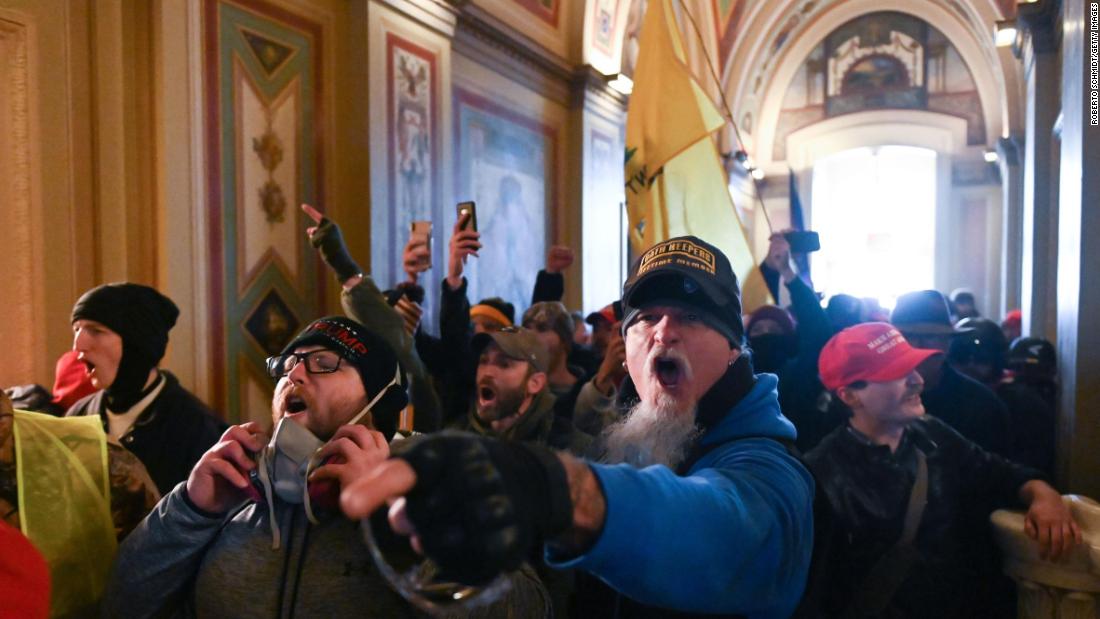
Supporters of President Donald Trump protest after storming the US Capitol on January 6, 2021.
Analysis by John Blake, CNN
Sat November 20, 2021
(CNN)The Brute. The Buck. And, of course, the Thug.
Those are just some of the names for a racial stereotype that has haunted the collective imagination of White America since the nation's inception.
The specter of the angry Black man has been evoked in politics and popular culture to convince White folks that a big, bad Black man is coming to get them and their daughters.
I've seen viral videos of innocent Black men losing their lives because of this stereotype. I've watched White people lock their car doors or clutch their purses when men who look like me approach. I've been racially profiled.
It's part of the psychological tax you pay for being a Black man in America -- learning to accept that you are seen by many as Public Enemy No. 1.
But as I've watched three separate trials about White male violence unfold across the US these past few weeks -- the Kyle Rittenhouse trial, the Ahmaud Arbery death trial and the civil case against organizers of the 2017 Unite the Right rally in Charlottesville -- I've come to a sobering conclusion:
There is nothing more frightening in America today than an angry White man.

Kyle Rittenhouse carries a rifle in Kenosha, Wisconsin, on August 25, 2020, during a night of unrest following the police shooting of Jacob Blake. Rittenhouse shot three people, two fatally, that night but was acquitted this week after claiming self-defense.
It's not the "radical Islamic terrorist" that I fear the most. Nor is it the brown immigrant or the fiery Black Lives Matter protester, or whatever the latest bogeyman is that some politician tells me I should dread.
It's encountering an armed White man in public who has been inspired by the White men on trial in these three cases.
The US' legacy of White male violence
I'm not suggesting we start racially profiling White men. The vast majority of White men are no menace to society.
Countless White men swallowed tear gas and braved rubber bullets while marching with demonstrators during last year's protests over the murder of George Floyd. Plenty of White men -- like the Rev. James Reeb, a White Unitarian minister -- died for Black people during the civil rights movement.
There is nothing inherently violent about White men, or any human being.
But recent events have convinced me it's time to put another character on trial: A vision of White masculinity that allows some White men to feel as if they "can rule and brutalize without consequence."

Demonstrators during a protest outside the US Capitol in Washington on January 6, 2021.
This angry White man has been a major character throughout US history. He gave the country slavery, the slaughter of Native Americans, and Jim Crow laws. His anger also helped fuel the January 6 insurrection at the Capitol.
It's this angry White man -- not the Black or brown man you see approaching on the street at night -- who poses the most dangerous threat to democracy in America.
That's a sweeping claim. But these trials represent something bigger than questions of individual guilt or innocence. They offer a disturbing vision of the future, and a choice about what kind of country we want to live in.
The facts of the trials are well known to many Americans.
In Wisconsin, a jury found Kyle Rittenhouse not guilty of all charges in the shooting deaths of two men and the wounding of another during a racial protest last year.
Rittenhouse, who was 17 at the time, said he was in Kenosha during the protests after the police shooting of Jacob Blake to help protect property. He said he shot the men in self-defense.
In Georgia, three White men are accused of chasing and killing Ahmaud Arbery, a 25-year-old Black man, last year while he was jogging. The men say they were trying to conduct a lawful citizen's arrest, and the man who shot Arbery says he acted in self-defense.
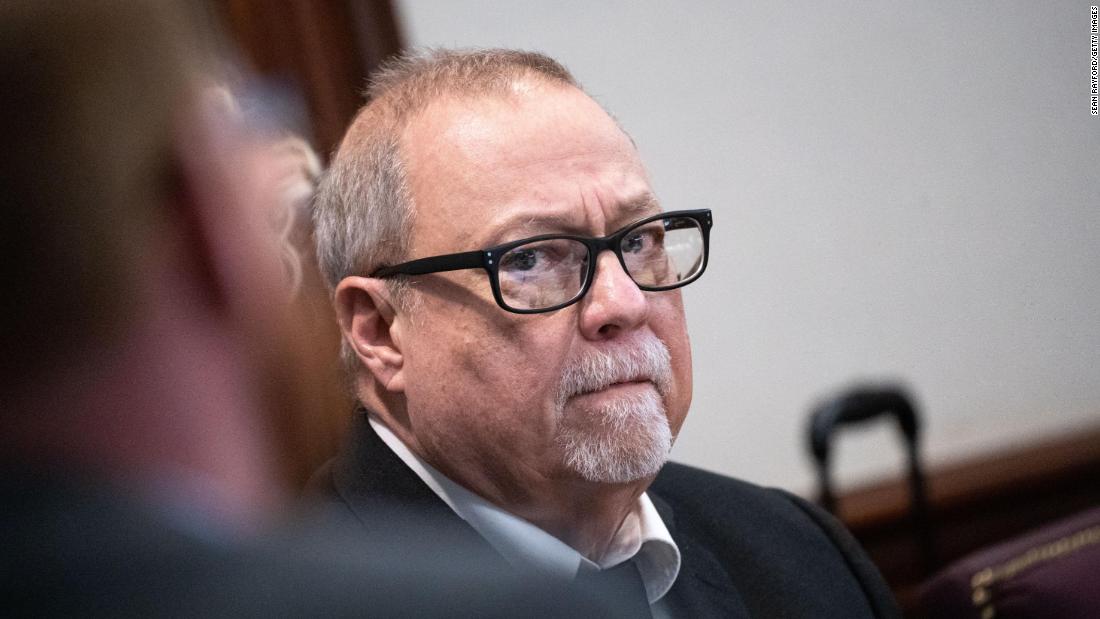
Defendant Greg McMichael listens during the trial over Ahmaud Arbery's shooting death on November 8, 2021, in Brunswick, Georgia.
And in Virginia, a civil trial is underway to determine if organizers of the "Unite the Right" rally intended to incite racial violence. One person was killed and dozens injured there after White supremacists clashed with counter-demonstrators.
Race is an inescapable theme that runs through all the trials. At the center of each are White men who are accused of using unjustified violence, either against an unarmed Black man or during racial protests. In Rittenhouse's case, a jury cleared him of criminal wrongdoing.
It's what's happening outside these courtrooms, though, that is most frightening. It suggests these trials are a symptom of a dangerous shift.
Our politics are becoming more menacing
If there was an Exhibit A to describe this shift, it might be an animé video. Earlier this month, Republican Rep. Paul Gosar posted a photoshopped animé video to his Twitter and Instagram accounts showing him attacking President Joe Biden and appearing to kill Democratic Rep. Alexandria Ocasio-Cortez with a sword.
The House voted this week to censure Gosar, with virtually no Republicans backing the resolution. Gosar took down the video after facing criticism but did not apologize, and later retweeted a post that contained the video.
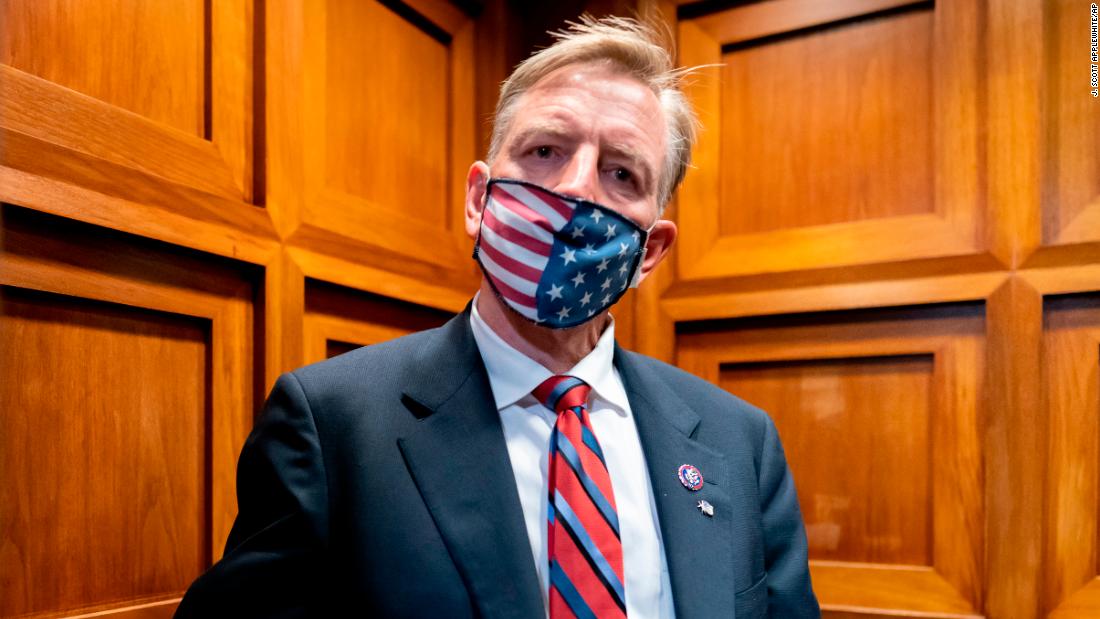
Congressman Paul Gosar of Arizona takes an elevator on Capitol Hill in Washington on November 17, 2021.
Gosar's video wasn't an isolated incident. Violent political rhetoric has been escalating among some members of the Republican Party. And while not all of it is fueled by White men, much of it starts at the top -- with former President Donald Trump.
Trump's violent and sexist rhetoric has been well-documented. More White men now identify as Republican, and the gender gap between both major parties is as large as it's ever been in the last two decades.
One New York Times columnist, under the headline "The Angry White Male Caucus," said this anger is driven by White men who fear a changing America "in which the privilege of being a white man isn't what it used to be."
The anger also seems to be getting worse. After President Joe Biden signed an infrastructure bill into law this month, some House Republicans who voted for it reported receiving death threats. Election officials and school board members across the country are also reporting escalating threats. A recent poll revealed that 30% of Republicans believe that violence is justified to save the country.
Political violence is not limited to the GOP. A Bernie Sanders supporter who publicly declared his hatred of conservatives shot five people at a Republican baseball practice in 2017.
But talking about assaulting and killing political enemies has become so normal -- and seemingly acceptable -- in conservative circles today that a White man felt comfortable enough to ask a right-wing activist at a public forum in Idaho last month:
"When do we get to use the guns? ... How many elections are they going to steal before we kill these people?"
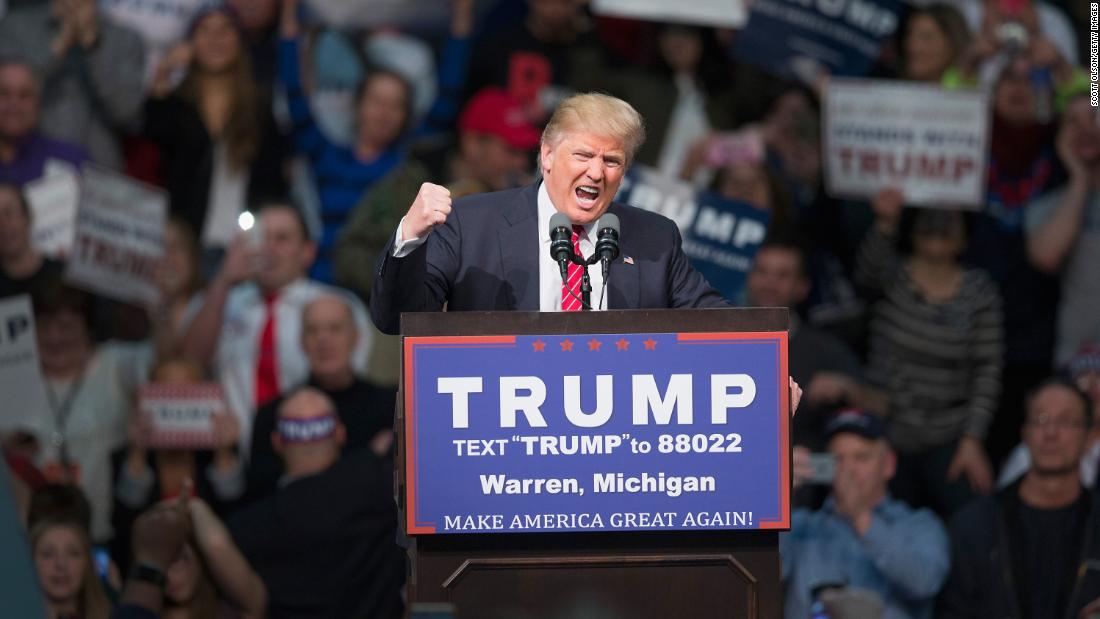
President Donald Trump speaks during a rally on March 4, 2016, at Macomb Community College in Warren, Michigan.
Add to this toxic political atmosphere another element: Laws that not only protect White vigilante violence but, in some cases, seem to embolden vigilantes.
Activists hoped that widely seen videos showing White police officers and White men shooting Black men like Arbery would inspire the courts and state legislatures to revisit laws that made such actions possible.
But even after nationwide protests over the murder of George Floyd by a White police officer, little has changed. A growing number of Americans now want police funding increased. And though Georgia overhauled its citizen's arrest law, a reform bill called the George Floyd Justice in Policing Act died in Congress two months ago.
We could see more guns on the streets
The conservative-leaning US Supreme Court now seems poised to make it easier for people to carry guns in public, based on recent oral arguments over a New York gun control law.
The US' civilian population is already the most heavily armed in the world. And our streets could soon become even more violent.
"A significant portion of the gun safety movement's current agenda is likely to come under attack in the coming years," Adam Winkler, a UCLA law professor and author of "Gunfight: The Battle Over the Right to Bear Arms in America," recently told Newsweek. "I think bans on assault weapons and bans on high-capacity magazines are ripe for the new Supreme Court, with its newly invigorated Second Amendment, to strike down."

Members of far-right militias rally near Stone Mountain Park in Georgia on August 15, 2020.
The Supreme Court has also recently ruled once again in favor of "qualified immunity," the legal doctrine that shields police officers accused of misconduct. There's been little national movement on reforming "stand your ground laws," some of which allow people who believe they're facing an imminent threat to use lethal force without first trying to escape. At least 25 states have such laws, according to the National Conference of State Legislators.
And despite the shocking nature of the Arbery video, there's been little progress on reforming citizen's arrest laws, which allow private citizens to detain or arrest someone they suspect in a crime.
The White men on trial in the Rittenhouse and Arbery cases both said they acted in self-defense. One of the men in the Arbery case testified that the unarmed Black jogger tried to take his gun, and his life was at risk.
But consider the potential danger of other White men -- or any person wielding a gun in public -- feeling emboldened to use deadly force against even an unarmed person by evoking the logic in those defenses, said Eric Ruben, a Second Amendment expert.
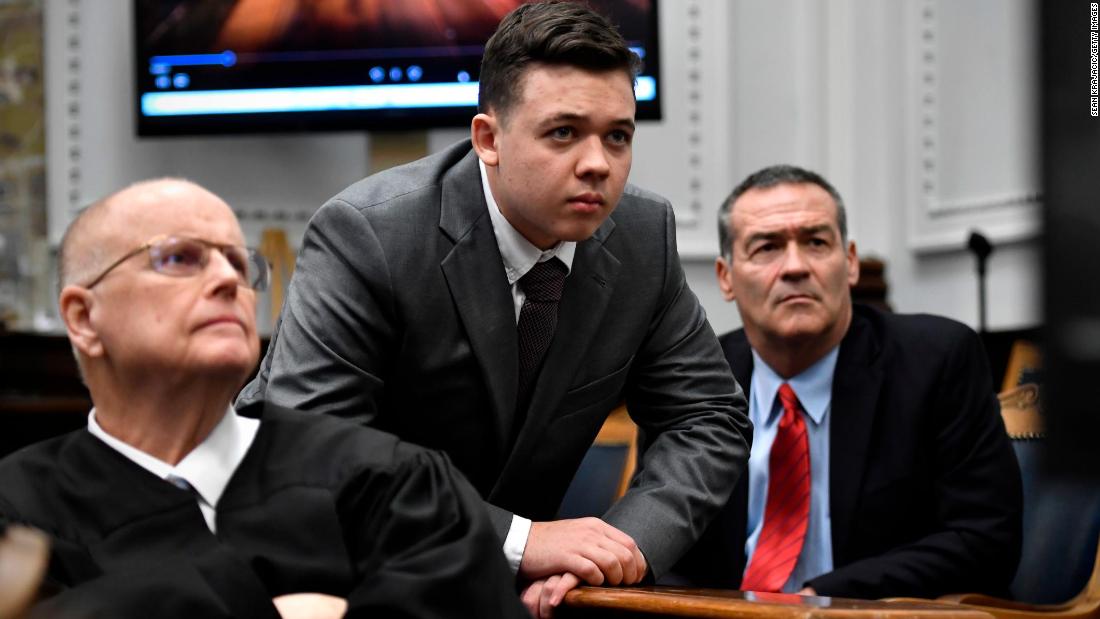
Judge Bruce Schroeder, left, Kyle Rittenhouse, center, and his attorney Mark Richards watch an evidence video during Rittenhouse's trial on November 12, 2021 in Kenosha, Wisconsin.
"In other words, their own decision to carry a gun became a justification to use it, lest it be wrested away from them," Ruben recently told the New York Times.
While prosecutors didn't show that Rittenhouse was angry that night, there is a perception -- fair or not -- that he went to Kenosha for reasons more than simply maintaining public safety.
The comedian Trevor Noah reflected this sentiment in a comment that became a meme: "No one has ever thought, 'Oh, it's my solemn duty to pick up a rifle and protect that TJ Maxx."
And finally, there's a growing fear that no one will be severely punished for the January 6 insurrection because most of the rioters were White. The trials of various defendants are winding their way through the courts now. Jacob Chansley, the so-called "QAnon Shaman," was sentenced to 41 months in prison for his role in the US Capitol riot.
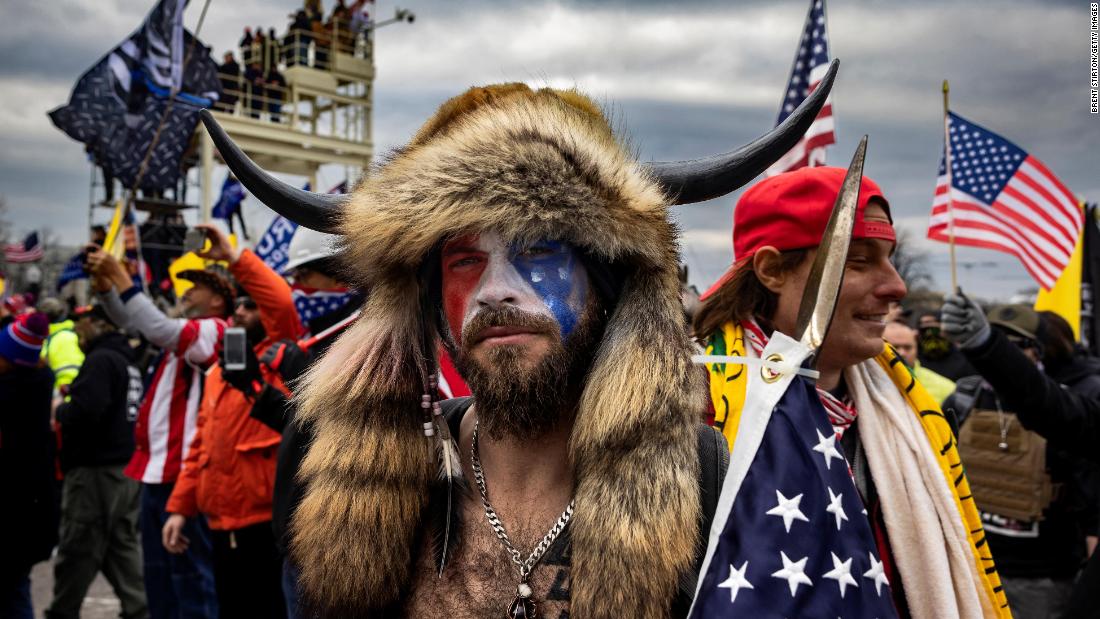
Jacob Anthony Angeli Chansley, known as the "QAnon Shaman," is seen at the Capital riots on January 6, 2021 in Washington. He was recently sentenced to 41 months in prison.
But many believe the punishment will never match the severity of the crime. What if, say, a mob of Black Lives Matter protesters attacked the US Capitol in an attempt to overturn the election of a Republican president? How do you think conservative lawmakers would react?
We are seeing more threats, more guns and more suspicion that the courts will go easy on White people who employ violence. This is the combustible mix that makes more violence almost inevitable.
Angry White men have damaged democracy
We have enough problems with White male violence as it is. Mass shootings in the US are committed more often by White men than by any other group. Top law enforcement officials now say the nation's biggest domestic terror threat comes from White supremacists. And many of the most indelible news images of recent years include angry, red-faced White men, often armed with guns.
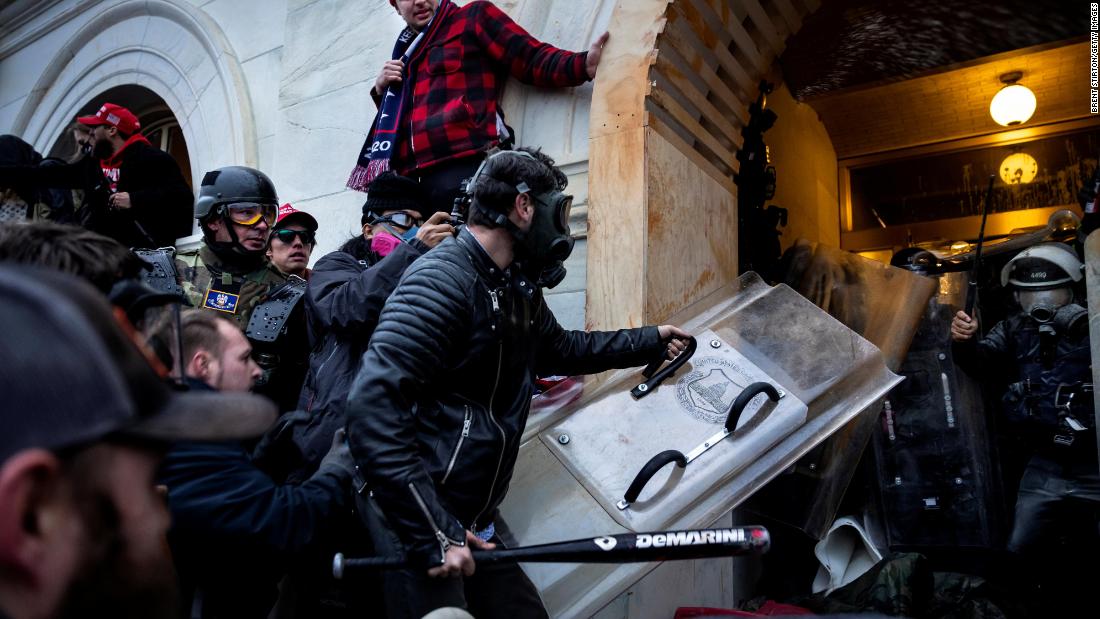
Trump supporters clash with police and security forces as they try to storm the US Capitol on January 6, 2021 in Washington.
Consider scenes from the US Capitol riot, which were filled with angry White men wielding crude weapons and pummeling police. Or the snarling faces of young White men holding tiki torches during the 2017 rally in Charlottesville. Or the angry White men who clashed with anti-racist protesters across the US last year.
White male anger has become one of the most potent political forces in contemporary America. That anger helped a White man win the White House. Trump's rise to power is inconceivable without his ability to tap into White male anger and embody it.
Has there ever been an angrier modern president? He is the White male id unleashed.
This White male anger is causing many people -- including other White men -- to look over their shoulder when they go out in public. The two men who were shot and killed by Rittenhouse in Wisconsin were White, as was the man he wounded.
Ijeoma Oluo, author of "Mediocre: The Dangerous Legacy of White Male America," wrote that she lives with the constant fear that angry White men will turn violent toward her and "countless other black people, brown people, disabled people, queer people, trans people, and women of every demographic."
White male anger could prove to be one of the biggest roadblocks we face in building a successful multiracial democracy.

White supremacists chant at counter protesters after marching through the University of Virginia campus with torches in Charlottesville, Virginia, on August 11, 2017.
Lee Drutman, a scholar who has studied political violence, recently told the New York Times: "I have a hard time seeing how we have a peaceful 2024 election after everything that's happened now. I don't see the rhetoric turning down, I don't see the conflicts going away. I really do think it's hard to see how it gets better before it gets worse."
This isn't hyperbole. It's history. It happened before.
After the Civil War, the US attempted to build the first biracial democracy by incorporating formerly enslaved people into the country's political and economic life. That period, known as Reconstruction, was destroyed primarily by the violence of White men who used terrorist and vigilante groups like the KKK to assassinate elected officials, prevent Blacks from voting and overthrow state governments.
In 1898, for example, a mob of primarily White men staged a coup against the city government of Wilmington, North Carolina, which had elected a multiracial coalition of leaders. More than 60 Black people were killed, and Black residents of the city were barred from voting, and from elected office, for decades afterward.
The January 6 insurrection wasn't unprecedented. In many ways it was a sequel.
No more lectures about Black 'thugs'
Republican Sen. Lindsey Graham warned the GOP that "We're not generating enough angry White guys to stay in business for the long term."
He was wrong. The angry White guy business is booming. Yet no matter how obvious it becomes that the country has a problem with White male violence, most Americans will escape what Black and brown men experience on a weekly basis.
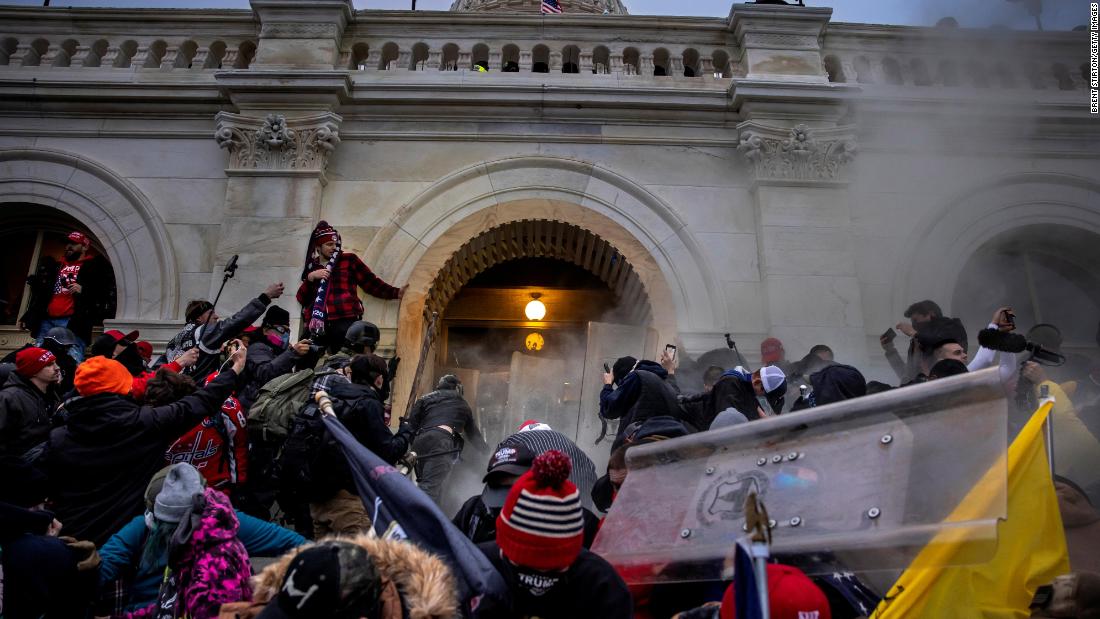
Trump supporters clash with police and security forces as people try to storm the US Capitol on January 6.
Not many drivers will lock their doors when White men approach at a stoplight. Few women will clutch their purse when they pass a White man on the street.
Someone recently posted a meme about this double standard by evoking the memory of Tamir Rice, the 12-year-old Black boy who was killed in Cleveland by a police officer who authorities said mistook his toy pistol for a real firearm.
"Tamir Rice was 12 and killed for having a fake toy gun. Kyle Rittenhouse, 17, killed two people. Walked by police after killing two people. Got to go home and sleep."
That meme is why it's hard for me for to tolerate hearing another lecture about "Black thug culture" or a "Black culture of violence."
My response to the White men who use these tired phrases: Look in the mirror.
And look at these three trials, because they point to one frightening future. This is what that future looks like: More angry White men emboldened by "stand your ground" and citizen's arrest laws, inspired by a conservative interpretation of the Second Amendment.
And more dead Americans.












